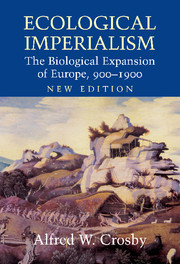Book contents
- Frontmatter
- Dedication
- Introduction
- Contents
- List of illustrations
- Preface to the new edition
- Acknowledgements
- 1 Prologue
- 2 Pangaea revisited, the Neolithic reconsidered
- 3 The Norse and the Crusaders
- 4 The Fortunate Isles
- 5 Winds
- 6 Within reach, beyond grasp
- 7 Weeds
- 8 Animals
- 9 Ills
- 10 New Zealand
- 11 Explanations
- 12 Conclusion
- Appendix: What was the “smallpox” in New South Wales in 1789?
- Notes
- Index
8 - Animals
Published online by Cambridge University Press: 05 August 2013
- Frontmatter
- Dedication
- Introduction
- Contents
- List of illustrations
- Preface to the new edition
- Acknowledgements
- 1 Prologue
- 2 Pangaea revisited, the Neolithic reconsidered
- 3 The Norse and the Crusaders
- 4 The Fortunate Isles
- 5 Winds
- 6 Within reach, beyond grasp
- 7 Weeds
- 8 Animals
- 9 Ills
- 10 New Zealand
- 11 Explanations
- 12 Conclusion
- Appendix: What was the “smallpox” in New South Wales in 1789?
- Notes
- Index
Summary
We have a bellyfull of victuals everyday, our cows run about, and come home full of milk, our hogs get fat of themselves in the woods: oh, this is a good country.
—J. Hector St. John de Crèvecoeur, Letters from an American Farmer (1782)The marinheiros taught their apprentices how to cross the oceans, and the latter did so, taking large numbers of people with them. Then the passengers, landsmen and women, had to make homelands of their new lands. The task was not beyond the range of their capabilities – they could have managed, given enough time – but it was beyond the range of their preferences. They were Europeans, not Americans or Australasians, and would never have adapted voluntarily to the new lands in their pristine condition. The migrant Europeans could reach and even conquer, but not make colonies of settlement of these pieces of alien earth until they became a good deal more like Europe than they were when the marinheiros first saw them. Fortunately for the Europeans, their domesticated and lithely adaptable animals were very effective at initiating that change.
The prospective European colonists were livestock people, as their ancestors had been for millennia. The founders of the Neo-Europes were descendants, culturally and often genetically, of the Indo-Eüropeans, a west central Eurasian people who spoke the ancestral language of most of the tongues of Europe (English, French, Spanish, Portuguese, German, Russian, etc.), a people who were practicing mixed farming, with heavy emphasis on herding, 4,500 years before Columbus.
- Type
- Chapter
- Information
- Ecological ImperialismThe Biological Expansion of Europe, 900–1900, pp. 171 - 194Publisher: Cambridge University PressPrint publication year: 2004

